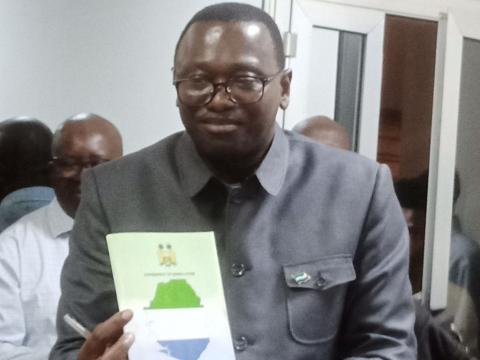By Chernor Alimamy Kamara
In the medium term, the Government is expecting inflation to drop to 23% by the end of 2024 and a further decline in 2025 and 2026, with a tight monetary policy stance, prudent fiscal policy, and anticipated moderation in global food and energy prices. Inflation currently stands at between 42% and 47%.
The Chairman of the National Council for Civic Education and Democracy (NaCCED), Kalilu I. Totangi alongside officials from the Ministry of Finance, gave an overview of the Citizen’s Guide to the National Budget for 2024 at the Ministry’s conference room on the 12th March, 2024. He said the economy was forecast to grow by 2.7 percent in 2023 largely due to the difficult global economic environment, combined with high food and energy prices.
Totangi recalled that the citizens' budget started way back in 2021 to enlighten the public about government expenditure. He said the budget looked at inflation, Gross Domestic Product (GDP), budget overview, and revenue mobilization measures.
The Guide titled “The Economy at a Glance” was centered on the budget theme of “restoring macroeconomic stability while protecting the poor and vulnerable”. It says inflationary pressures persisted throughout 2023, mainly on account of imported inflation, domestic food supply shocks, adjustments in fuel prices, and continuous depreciation of the exchange rate.
It highlighted that exports increased by 16.1 percent to US$ 659.2 million (six hundred and fifty-nine million dollars) during the first half of 2023 relative to the first half of 2022 of which mineral exports amounted to US$ 584.7 million (five hundred and eighty-four million dollars), with iron ore exports increasing by 54.7 percent to US$ 391.0 million (three hundred and ninety-one million dollars).
Total import bill declined marginally by 0.4 percent to US$ 968.6 million (nine hundred and sixty-eight million dollars) in the first half of 2023 relative to the first half of 2022. The trade deficit narrowed to US$ 309.4 million (three hundred and nine million dollars) in the first half of 2022, reflecting mainly the strong growth in mineral exports.
The economic outlook is susceptible to several significant downside risks including spillovers from ongoing geo-political tensions, economic fragmentation, escalation of the Russia/Ukraine crisis, and continuous depreciation of the exchange rate, among others.
“There is an urgent need to strike an appropriate balance between revenue effort and expenditure management to reduce the budget deficit and Government borrowing from the banking system, thereby helping to arrest the rate of exchange rate depreciation and lower inflation’’, part of the guide reads.
It also says that “enhanced fiscal discipline will create the fiscal space needed to increase spending on Government priorities’’, and that “to achieve this balance requires deliberate efforts to intensify domestic revenue collection and prudently manage and control Government expenditure”.
In his statement, Financial Secretary (FS) Mathew Dingie noted that the citizen’s budget launched is the same budget that the Minister of Finance, Sheku Ahmed Fantamadi Bangura read in Parliament a few months ago. He said the budget is a technical document that he would like the press, District Budget Oversight Committees (DBOCs), and Non-State Actors (NSAs) to update the public about.
Finance Minister Sheku Fantamadi Bangura in his statement before launching the guide recalled that over the last two years, it has been challenging for Sierra Leone where development needs are very high in the midst of limited fiscal space, high vulnerability, and multiple external shocks.
He explained that the external environment has not been favorable as the recovery of the global economy is losing momentum due to the slowdown of the Chinese economy, disruptions of the energy and food markets caused by the Russia-Ukraine war, and the impact of tighter monetary policy to fight global inflation.
“The situation has been exacerbated by heightened geo-political tensions, economic fragmentation, and climate change risks,” he said.
He stated that the theme for the 2024 budget emanated against the backdrop of global economic uncertainty, high cost of living, and food insecurity.
Bangura assured Sierra Leoneans that the Government is implementing policies that will reset the economy and restore macroeconomic stability, raise significant revenues, implement structural and public reforms, expand digital and physical infrastructure, increase food production, promote exports, and protect the vulnerable and socially excluded.
He called on Sierra Leoneans to continue to strengthen their participation in budget planning, monitoring, and implementation as well as those related programmes both at local and national levels.
Copyright © 2024 Politico (13/03/24)








